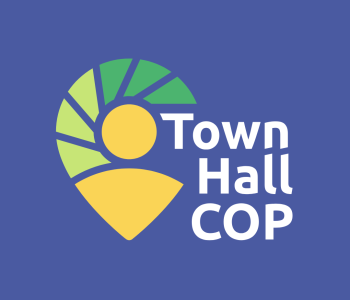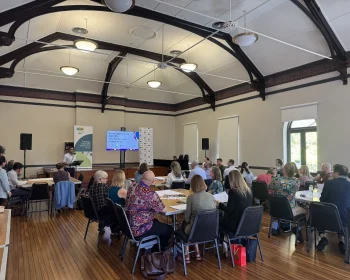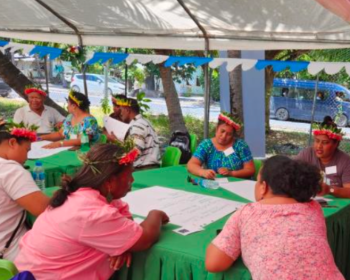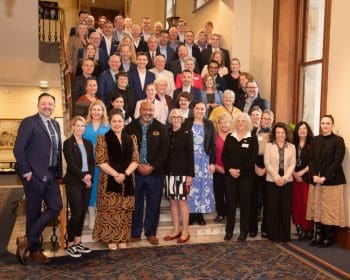Bringing the voice of cities and regions to the climate negotiation process
About the Local Governments and Municipal Authorities (LGMA) Constituency
Since the first Climate Conference of the Parties (COP) in 1995, the LGMA Constituency has served as the official voice for local and subnational governments within the United Nations Framework Convention on Climate Change (UNFCCC) – connecting them directly to global climate processes – with ICLEI serving as the Focal Point. The 2015 Paris Agreement marked a turning point, recognising the essential role of these governments in enhancing Nationally Determined Contributions (NDCs) and driving transformative climate action.
The LGMA Constituency has since advocated for a process that systematically recognises, engages, and empowers local and subnational government as central actors to global climate strategies. If successful at COP30 in Belém, this will become the new standard.
Through the Town Hall COPs initiative, local communities provide input, which local and subnational governments use to assess progress. The CHAMP process then channels this input to national governments, which incorporate it into their updated NDCs (3.0) before submission to the UNFCCC.
The LGMA Constituency’s role
Since the Earth Summit in 1992, when nine stakeholder groups, including local authorities, were designated as essential partners in implementing the global sustainability agenda, the LGMA Constituency has represented networks of local and regional governments under the UNFCCC. It has served as the voice of cities and regions since the first Conference of Parties (COP) in 1995 and continues to achieve advocacy success for multilevel action in the climate, nature and desertification processes.
Informing UNFCCC negotiations
The LGMA is the official channel of cities and regions to the UNFCCC, with more than 45 accredited networks of local and regional governments. The LGMA coordinates inputs to the global climate negotiations all year, influencing and informing outcomes toward meeting the Paris Agreement via regular communications and monthly webinars with thematic and regional working groups. On the ground at each COP, the LGMA Pavilions serve as the home for the LGMA inside the Blue Zone (the official negotiations space) and are developed in close collaboration with the COP host city, region and country, as well as other partners.
Setting the action agenda
The LGMA pushes for multi-stakeholder and sectoral representation across a busy advocacy calendar. Since 2015, the LGMA has worked closely through the Marrakech Partnership for Global Climate Action, a networking space for subnational collaboration, and with the High-Level Climate Action Champions nominated annually by the COP host country. The LGMA helps organisations commit and engage through various mechanisms and initiatives for ambitious action.
Collaborating with COP presidencies
The annual Climate COP is the highest decision-making forum for UNFCCC implementation. Each year, UN Regional Groups appoint a national government as the COP Presidency, nominate the High-Level Climate Action Champion, and set themes for action and negotiation based on their national and regional priorities. The LGMA seeks to engage with and support the COP Presidencies in order to inform and drive progress on special networks and initiatives the Presidencies may designate independent from the UNFCCC.
Advancing the UNFCCC Friends of Multilevel Action
The LGMA shapes the decisions made in official negotiations by national governments. This is done through informal dialogue with negotiators – representatives of climate or environment ministries of Parties that have ratified the UNFCCC, the Kyoto Protocol or the Paris Agreement – to ensure the voice of cities and regions is represented in final outcomes. For example, the LGMA initiated the “Friends of Cities” in 2013 and elevated the initiative to the “UNFCCC Friends of Multilevel Action” in 2019.
Town Hall COPs are an initiative pioneered by ICLEI through its role as the Focal Point for the LGMA Constituency to the UNFCCC. ICLEI Oceania is the lead organiser and facilitator for these events in the region, ensuring local commitments and calls to action are fed directly into the global negotiation process via official channels like the Cities and Regions Pavilion at the UN Climate COPs.
Town Hall COPs in Oceania: Amplifying local voices for global impact
Town Hall COPs are a powerful global movement designed to bridge the gap between local action and global climate policy. They are community-led forums that bring together local governments, community leaders and stakeholders to debate, define and drive ambitious climate action. The outcomes of these Town Hall COPs feed directly into the United Nations climate negotiations, ensuring the voices of local communities are heard on the world stage.
These dynamic events are building a powerful, unified voice from the region, ensuring that the communities on the frontlines of climate change are leading the charge for a resilient and just future.
Every Town Hall COP is tailored to its community but operates on three core, transformative principles:
- Community-led: The model is built around the unique needs, priorities, and traditional governance systems of each community.
- Nationally relevant: Insights and outcomes directly inform and strengthen national climate plans, particularly countries’ Nationally Determined Contributions (NDCs) under the Paris Agreement.
- Transformation-oriented: Discussions focus on the real-world connections between climate action and essential community priorities like health, jobs, justice, and culture.


Sydney, Australia (March 2025)
The first ICLEI-hosted Town Hall COP in the region brought together sixteen councils from the Greater Sydney Region. Held as part of Sydney Climate Action Week, it fostered robust discussions on strengthening local climate actions and mainstreaming them into Australia’s national policies. A key outcome was a powerful call for the Australian Federal Government to be bolder in its NDCs and accelerate the transition to renewable energy by ceasing new coal and gas approvals.

Tarawa, Kiribati (August 2025)
Kiribati made history by hosting the first Pacific Town Hall COP within a traditional maneaba (meeting house), embodying the spirit of collective action. The landmark outcome was the adoption of the Ikarekebai Declaration of Collective Responsibility, a powerful message from the people of Kiribati. The declaration underscores climate change as an existential threat and outlines local priorities, from food security to cultural resilience, while calling on major emitting nations for urgent support. This event powerfully demonstrated how traditional governance can guide modern climate action.

Adelaide, Australia (October 2025)
The Adelaide Town Hall COP highlighted South Australia’s role as a global leader in the renewable energy transition. With the state already generating over 70% of its power from renewables, the event showcased how local governments are the driving force behind this success. From the world’s first large-scale Tesla battery to community-led virtual power plants and hydrogen innovation, the Town Hall COP positioned South Australia as a powerful model of multi-level governance delivering real, tangible results in the race to a net-zero future.
